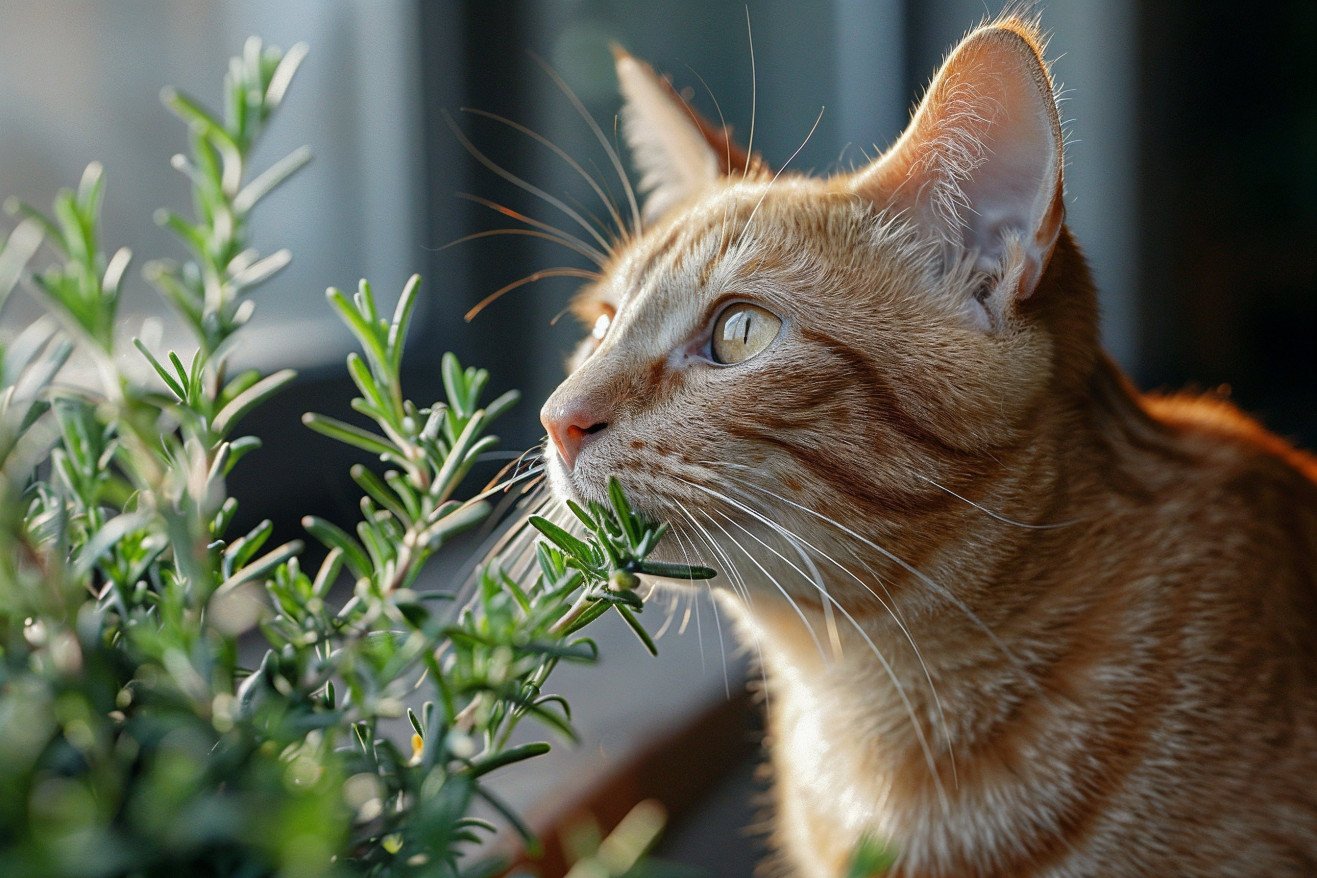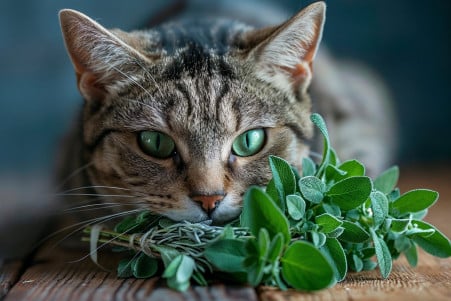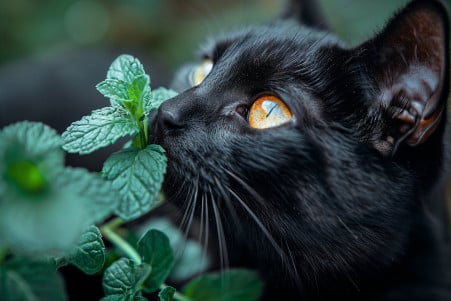Is Rosemary Toxic to Cats? Science-Based Answers
11 May 2024 • Updated 10 May 2024

Even though rosemary is a popular and safe herb for humans, cat parents may be concerned about the potential dangers of this fragrant plant for their furry friends. While rosemary is not toxic to cats, it can lead to gastrointestinal upset, including vomiting and diarrhea, if ingested in large amounts. This is because the volatile oils in rosemary can be irritating to a cat's mucous membranes in the mouth and stomach. Like any non-food item, it's best to keep rosemary plants out of your cat's way.
To learn more about the potential impact of rosemary on cats, let's explore studies conducted by veterinary researchers and animal welfare groups. This scholarly research will help us understand the specific chemical compounds in rosemary that may affect cats. In addition, we'll investigate how common rosemary toxicity is in order to assess the risk this herb poses to our feline friends. This evidence-based analysis will empower you to decide whether or not to keep rosemary in a household with cats.
Is rosemary toxic to cats?
Rosemary's Effects on Cats: Signs and Precautions
Although rosemary is listed as non-toxic to cats by the ASPCA, it can cause gastrointestinal upset if ingested in large amounts. This is because the plant's volatile oils, especially those containing camphor, can cause irritation to the mouth, stomach and intestines if ingested in high doses.
If a cat does consume too much rosemary, symptoms of toxicity can include vomiting, diarrhea, lethargy, drooling, difficulty breathing, and even central nervous system depression. Cats with liver or respiratory issues, such as asthma, may be more susceptible to the negative effects of rosemary exposure, according to the Pet Poison Helpline.
It's also important to note that rosemary essential oil should never be used around cats, as it can be toxic if inhaled or ingested. This is because the higher concentration of volatile oils in essential oils can make them toxic, and they should never be used with cats. However, as long as cat owners are aware of the potential dangers and watch for signs of a bad reaction, they can ensure that their cat's exposure to rosemary is safe.
How to Feed Rosemary to Cats: Everything in Moderation
Although rosemary is not toxic to cats, it should still be fed to them in moderation. CatTime recommends adding a small amount of fresh or dried rosemary to a cat’s food, and then keeping an eye out for any negative side effects. That said, there is no scientific proof that rosemary has any health benefits for cats when ingested, according to Wishbone Pet Foods.
In fact, cats may be more interested in the smell of rosemary than the taste. Medium also recommends talking to a vet before making any big changes to a cat’s diet or adding any new herbs and spices.
Rosemary as a Flea and Tick Repellent for Cats
Some cat parents have turned to rosemary as a natural flea and tick repellent for their furry friends, using it in spray form or adding it to baths. According to AvoDerm, rosemary's pungent smell is thought to keep pests away, which could help people avoid using chemical repellents on their pets. However, the Spruce warns that rosemary essential oil is highly concentrated and should never be applied directly to a cat's skin or fur because it can be toxic.
Both Wondercide and Isabella's Clearly note that using rosemary in a diluted spray or bath is a safer option, but cat parents should still be careful and observe how their pet responds. It's always a good idea to talk to a vet before trying out a new flea and tick prevention method, especially if it involves essential oils, according to VCA Hospitals.
More Herbs and Plants That Are Toxic to Cats
Although rosemary is safe for cats as long as it's used in moderation, there are many other popular herbs and plants that can be harmful. According to Herbs Toxic To Cats: 13 Herbs To Avoid In Your Home, lavender, garlic, onion, and marijuana are just a few examples of herbs that are toxic to cats and can cause a variety of symptoms, including digestive upset and heart issues. The ASPCA's Toxic and Non-Toxic Plants list also includes other toxic plants like St. John's Wort, foxglove, and chamomile.
Cat owners should make sure to research any new plants or herbs they plan to bring into their home or garden thoroughly, as Vets Now notes. Removing toxic plants and creating a secure outdoor area can also help prevent cats from being exposed to toxic substances. If a cat does eat something that may be toxic, pet parents should contact a vet or the ASPCA Animal Poison Control Center at 1-888-426-4435 immediately.
Conclusion: Use Rosemary for Cats in Moderation and With Caution
Although rosemary is generally safe for cats, Western Marsh Rosemary is a notable exception. Studies have shown that the terpenoids and glycosides in Western Marsh Rosemary can have a negative impact on a cat's heart and central nervous system, which can lead to a number of health problems.
Cats are particularly susceptible to these toxins because their livers lack the enzymes necessary to metabolize and excrete these compounds. Even small amounts of Western Marsh Rosemary can cause symptoms, including drooling, pawing at the mouth, swollen lips, lethargy, and muscle weakness.
If a cat is suspected of ingesting Western Marsh Rosemary, it's important to act fast. Remove any plant material from the cat's mouth, rinse gently with water, and seek veterinary care immediately. Depending on the severity of the situation, treatments may include inducing vomiting, administering activated charcoal, or providing IV fluids.
To prevent exposure to toxic plants, it's best to avoid Western Marsh Rosemary and use non-toxic herbs like regular rosemary or thyme instead. In addition, cat owners can take steps to protect their pets by keeping indoor plants on high shelves or in hanging baskets and creating cat-safe outdoor spaces. In general, it's best to talk to a veterinarian before giving cats any herbs or spices.


